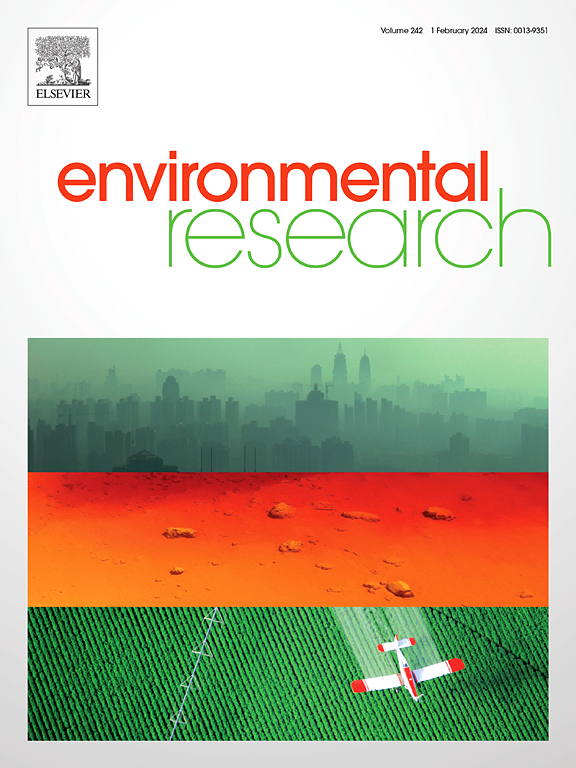Causal relationship between PM2.5 exposure and population-level antidepressant medication use: A Mendelian randomization study using GWAS data from multi-biobank
IF 7.7
2区 环境科学与生态学
Q1 ENVIRONMENTAL SCIENCES
引用次数: 0
Abstract
Exposure to fine particulate matter (PM2.5) has been associated with an increased risk of depression; however, causal evidence regarding its influence on the clinical burden of depressive symptoms remains limited. In this study, we conducted a two-sample Mendelian randomization (MR) analysis to assess whether genetically predicted chronic PM2.5 exposure is causally associated with the likelihood of antidepressant medication use. Antidepressant use, as derived from national prescription registers, serves as an objective, treatment-based proxy likely indicative of greater symptom burden, capturing clinically managed depression at the population level. Genome-wide association study (GWAS) summary statistics were utilized, involving data on PM2.5 exposure (n = 423,796 European participants) and antidepressant medication usage (131,176 cases, 104,642 controls). Forty-eight single-nucleotide polymorphisms (SNPs) associated with PM2.5 exposure (p < 5 × 10^-6) were selected as instrumental variables. Primary analyses employed the inverse-variance weighted (IVW) method, complemented by comprehensive sensitivity analyses. Our results revealed that genetically predicted PM2.5 exposure was associated with a higher prevalence of antidepressant use (IVW OR = 1.496; 95 % CI: 1.238–1.808; p < 0.001). Findings were consistent across multiple MR methods, including weighted median and simple mode analyses. Sensitivity analyses identified no evidence of directional pleiotropy or influential outlier SNPs. In conclusion, this Mendelian randomization study provides genetic evidence supporting a potential causal relationship between chronic PM2.5 exposure and an increased prevalence of antidepressant medication use, which may be indicative of greater depressive symptom burden at the population level. These findings suggest that reducing air pollution could be a valuable strategy for mitigating the global burden of depression.
PM2.5暴露与人群水平抗抑郁药物使用的因果关系:一项孟德尔随机研究,使用来自多生物库的GWAS数据
暴露于细颗粒物(PM2.5)与抑郁症风险增加有关;然而,关于其对抑郁症状临床负担影响的因果证据仍然有限。在这项研究中,我们进行了一项双样本孟德尔随机化(MR)分析,以评估基因预测的慢性PM2.5暴露是否与使用抗抑郁药物的可能性有因果关系。来自国家处方登记册的抗抑郁药使用情况是一个客观的、以治疗为基础的指标,可能表明更大的症状负担,在人口水平上捕捉临床管理的抑郁症。利用全基因组关联研究(GWAS)汇总统计数据,包括PM2.5暴露(n = 423,796名欧洲参与者)和抗抑郁药物使用(131,176例,104,642例对照)的数据。48个单核苷酸多态性(snp)与PM2.5暴露相关(p <;5 × 10^-6)作为工具变量。初步分析采用反方差加权(IVW)方法,辅以综合敏感性分析。我们的研究结果显示,基因预测的PM2.5暴露与抗抑郁药使用的较高患病率相关(IVW OR = 1.496;95% ci: 1.238-1.808;p & lt;0.001)。包括加权中位数和简单模式分析在内的多种MR方法的结果是一致的。敏感性分析未发现定向多效性或有影响的异常snp的证据。总之,这项孟德尔随机化研究提供了遗传证据,支持慢性PM2.5暴露与抗抑郁药物使用增加之间存在潜在的因果关系,这可能表明在人群水平上抑郁症状负担更大。这些发现表明,减少空气污染可能是减轻全球抑郁症负担的一种有价值的策略。
本文章由计算机程序翻译,如有差异,请以英文原文为准。
求助全文
约1分钟内获得全文
求助全文
来源期刊

Environmental Research
环境科学-公共卫生、环境卫生与职业卫生
CiteScore
12.60
自引率
8.40%
发文量
2480
审稿时长
4.7 months
期刊介绍:
The Environmental Research journal presents a broad range of interdisciplinary research, focused on addressing worldwide environmental concerns and featuring innovative findings. Our publication strives to explore relevant anthropogenic issues across various environmental sectors, showcasing practical applications in real-life settings.
 求助内容:
求助内容: 应助结果提醒方式:
应助结果提醒方式:


